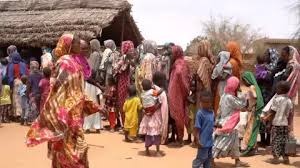Sudan’s Tragedy and Our Culture in Denying Civil Strife

Asharq Al Awsat
Two phrases often repeated by international organizations today compete whenever Sudan is mentioned: “It is the world’s biggest humanitarian tragedy” and “It is one of the world’s biggest humanitarian tragedies.” Over three months ago, when the horrific figures had not been as high as they are now, the United Nations warned that “Sudan is one of the worst humanitarian disasters in recent memory.”
It may suffice to mention one of many similar figures: the number of Sudanese who have been displaced by the war is now approaching nine million. That is, out of Sudan’s 47 million people, around one-fifth have been forced to flee their homes. All of these people are in urgent need of food and medicine, in addition to safety and shelter.
However, with the exception of what the Sudanese themselves write about their country, we hardly ever come across Arabic texts that draw or suggest concern for Sudan. It might not be hyperbolic to claim that reference to the “No’s of Khartoum” proclaimed at the 1967 Arab summit- when it was decided that, with regard to Israel, there would be “no peace, no negotiation, and no recognition” remains more prevalent than any other mention of Khartoum in its current tragedy.
No doubt, there are racists among us whose concern for Sudan is impeded by its Africanness and the dark skin of its inhabitants. However, in cultural milieus where that may not be the case, this neglect seems more complicated and discreet.
Indeed, the current state of affairs in Sudan amounts to a scandal for the consciousness of these cultural environments, which often consider that disputes and conflicts do not deserve to be called as such, let alone have attention paid to them, unless they are precipitated by a clash with a foreign Western power, and by extension, that victims are not victims unless such a power kills them.
As for the example that amounts to a slap in face to those who contemplate it, it is that the page on the victims of the Syrian regime’s genocide can be turned with time – mind you, their extermination was recent, and it even continues to this day; meanwhile those killed in Algeria in the previous century, remain with us to this day in the form of a perpetual epic, entitled “One Million Martyrs”, merely because it was the French who killed them.
Sudan is a country that scandalizes, as it speaks to the potency of civil strife and reflects its costs. However, it also reflects the difficulties of applying the nation-state formula; indeed, so severe are they that, in 2011, this single country was split into two independent Sudans, one in the north and another in the south. And so, in the face of these challenges, the need to deny these facts that unsettle and invalidate our dominant political culture seemed dire.



